- Learning time
- 30 minutes
- First play time
- 90 minutes
Babylonia
Designed by: Reiner Knizia
In Babylonia, players lead their clans through the productive period of history under the Babylonian reign of Nebuchadnezzar II. If it sounds like an epic undertaking, worry not: after that exploratory first play, you can blast through the entire period in under an hour…
Players each have a set of discs, representing three types of nobles (six of each) and farmers (- a dozen). You begin with a hand of five randomly drawn tiles, and on your turn, you simply place either two of any tile (matching or mixed) or as many farmers as you like from your hand out onto the board: the ancient land of Babylon, broken into hexes, populated by cities and fields. Where you place discs is the nub of the game, as every hex has some kind of allure: nobles adjacent to cities with matching noble symbols, or even connected via a chain of discs of your own colour, score you points once the city is surrounded. If you have the majority of discs around it, you claim the city tile itself too. The tile not only scores a point now, but will continue to score for the rest of the game – whenever anyone claims a city tile, all cities of all players are scored. So having claimed more cities than anyone else will provide an incremental scoring in your favour…
But cities are not necessarily the key to victory, because your farmers can also – if you have a disc adjacent to them – claim a field, which score points values of 5, 6 and 7 or a point per city already claimed – by all the players. These latter fields are worth nothing when no cities have been claimed, but have a tipping point – increasing in value until suddenly everyone is snatching them up as fast as possible! Note that you can add a disc to a river hex on the map too – it does nothing for you immediately, as it’s placed face-down – but can be utilised to connect distant nobles to cities…
Lastly, there are the majestic ziggurats – temples around which you can gather to score points. When you place next to a ziggurat you score a point for every ziggurat you have tiles next to. And crucially, when a ziggurat is surrounded the player with a majority of adjacent tiles can claim a bonus card: either a one-off considerable haul of ten points, or ongoing in-game benefits such as allowing you to play three nobles instead of two, or increasing your hand size to seven.
When one player runs out of tiles or there’s a single city left unclaimed, the game instantly ends – and most points is the winner!
Joe says
Babylonia is an absolute gem, the jewel in the crown (so far!) of its master creator Reiner Knizia's renaissance of the last few years. Although the setting and theme conjure scenes of an epic, this plays in under an hour, and turns will whizz by. Each of the games I've played have had a very different arc, simply because the gameplay is so reactive. You may have grand plans for furthering your own bounty, but they'll come to nothing if you don't constantly keep your opponents' schemes in check. The few rough edges of the implementation, as mentioned by Sam, aren't enough to dent this in my estimation. Like the best of its designer's oeuvre, Babylonia feels simultaneously rooted in the familiar, classic and yet completely fresh.
The guru's verdict

-
Take That!
Take That!
There's no direct combat, but there are certainly opportunities for spoiling moves, inadvertent or otherwise.
-
Fidget Factor!
Fidget Factor!
For a game that's low on story and feels more like a puzzle - an intriguing puzzle - Babylonia moves surprisingly fast once you're through the door.
-
Brain Burn!
Brain Burn!
The sense of option-juggling is at least limited by your hand of chips, which often streamline the decision-making process for you, if not always in the way you'd like. At the start the game is wide open, at the end opportunities on the board are closing up fast. The game's moderate lulls, such as they are, tend to congregate around the middle.
-
Again Again!
Again Again!
Designer Reiner Knizia tends to make games that feel and are eminently re-playable, due to the relatively low weight of the rules and high player interaction. Babylonia is happily no exception.

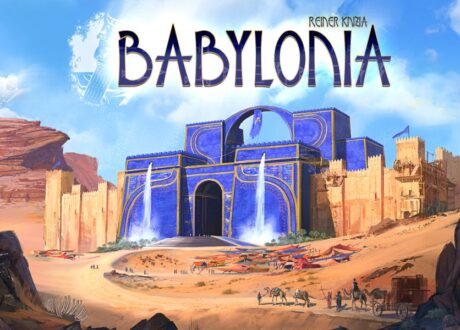

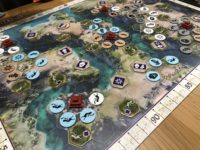

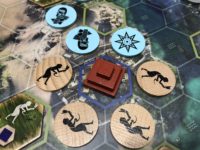
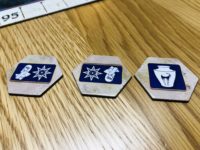


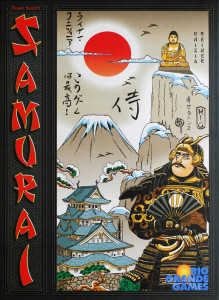

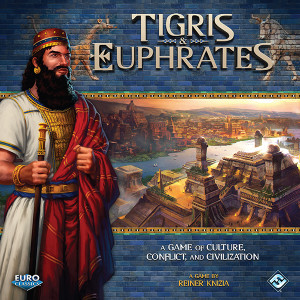
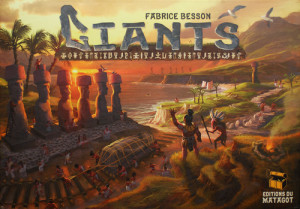
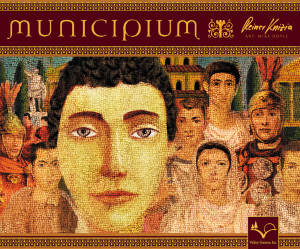
Sam says
I'd happily sit down to play Babylonia most nights of the week. It has the look and feel of a 'big' game without actually eating up a whole evening or driving anyone around the bend with an overload of rules. Yes, it feels a little unintuitive at first and no, it doesn't sing with theme and story like a few other games do. The stands to keep your discs hidden from view are badly designed and need a bit of customization to function. The river spaces are hard to read at a glance. But it's so deft and clever I can overlook things I might otherwise get a bit snobby about and just really enjoy a masterful design that weights every single decision with agonising deliciousness. Not one for the nippers, but for older kids and grown-ups both: this is a really excellent game from a designer who always creates interesting dynamics across the table.